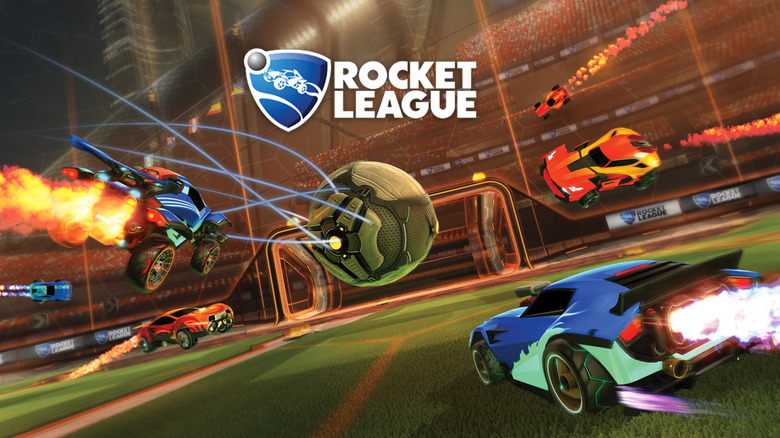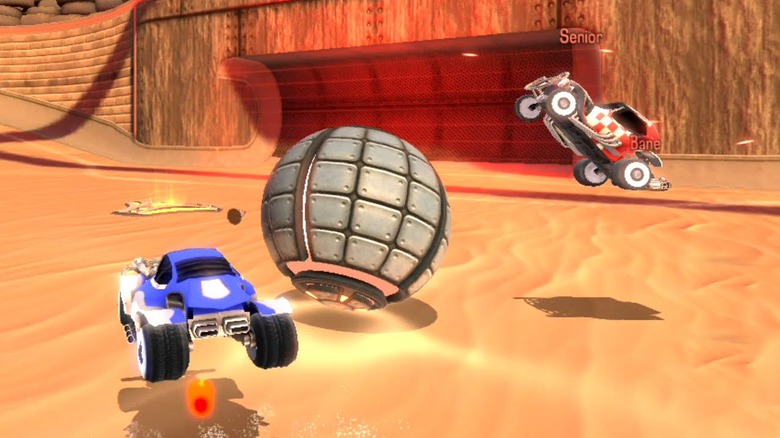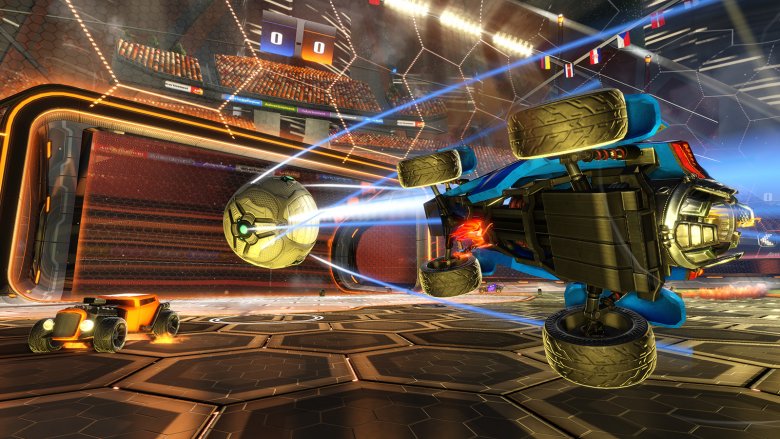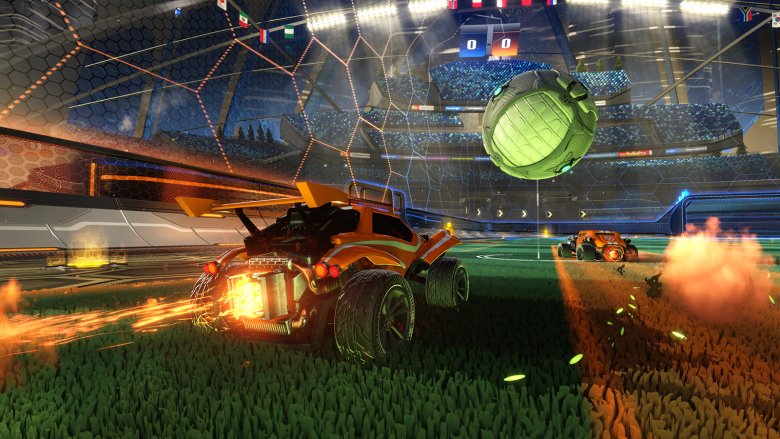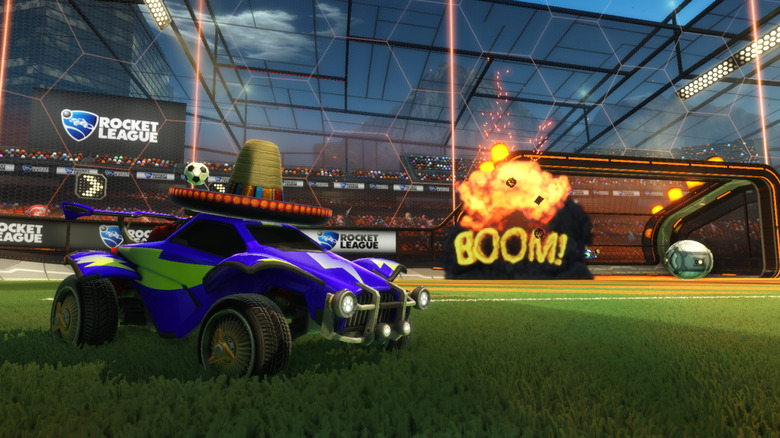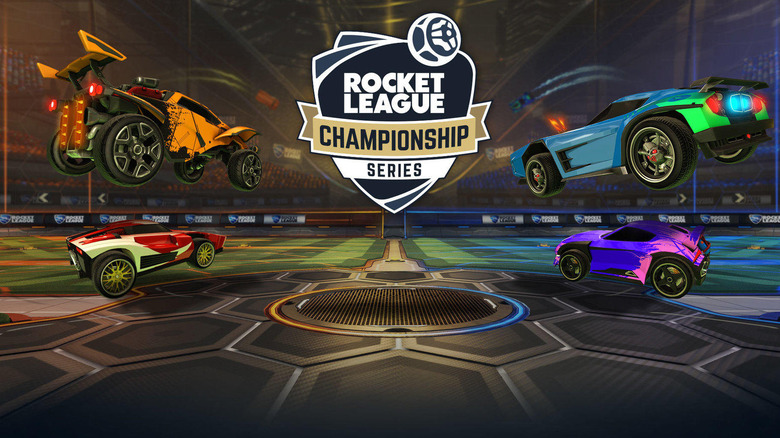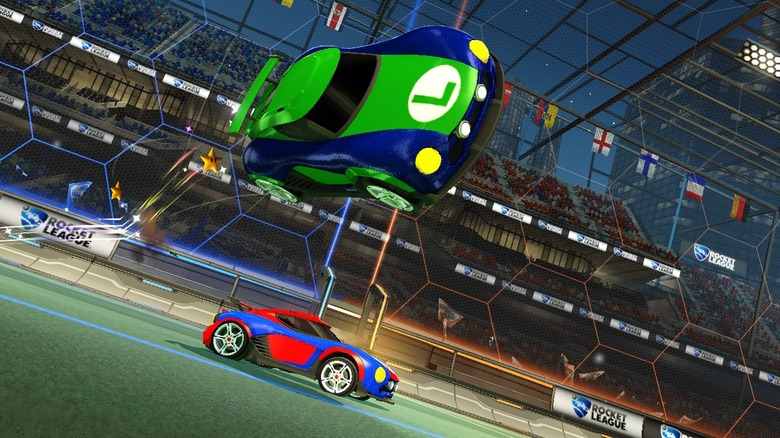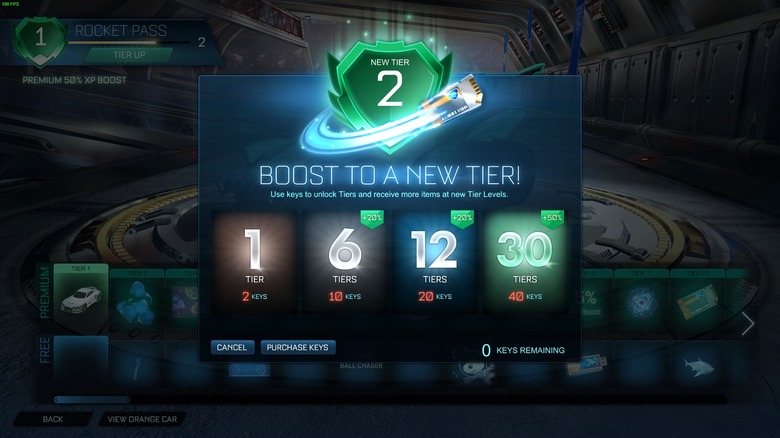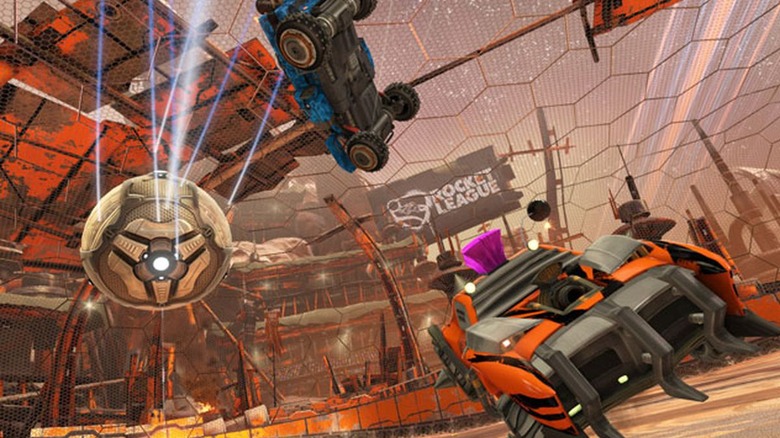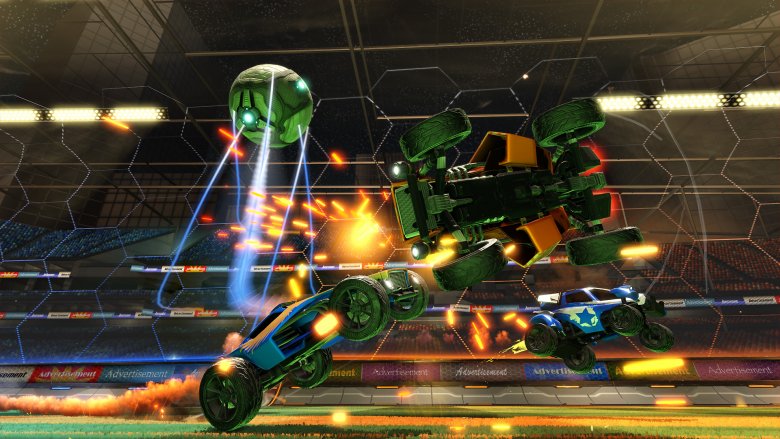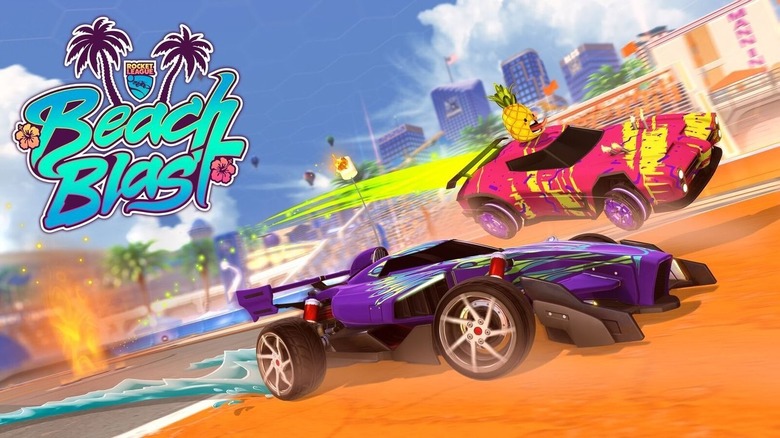The Untold Truth Of Rocket League
Imagine if you took the sport of soccer, made the field smaller, and gave players the ability to blow each other up without penalty. Now imagine you gave those same players rockets that could propel them to the air. Now imagine you replaced those soccer players with cars.
That, ladies and gentlemen, is Rocket League in a nutshell.
Rocket League distills the 90 minutes you might spend playing an actual soccer match into 5 minutes, and ensures that every moment you're on the pitch is both fast and intense. The game is easy to pick up, extremely difficult to master, and loads of fun to watch even if you don't have a controller in your hand.
Seriously. Turn on a competitive Rocket League match sometime and you'll marvel at the skill on display.
Rocket League is a bona fide hit — so much so that you've likely heard of it, at least. But you may not have the skinny on how the game came to be, or how exactly it became so popular. And that's exactly what you'll learn below.
Here is the untold truth of Rocket League.
Rocket League is actually a sequel
Rocket League has all the looks of a smash hit from a brand-new studio that hit the jackpot on its very first title. And if you're not familiar with developer Psyonix, Rocket League could be the first game you've ever seen by them. But it's not their first. In fact, Rocket League isn't even the first rocket-powered race car soccer game by the team.
That honor belongs to Supersonic Acrobatic Rocket-Powered Battle Cars. That's right: Rocket League is actually a sequel.
When you compare the two games side by side, you'll instantly see the similarities between them. The ball, the cars, the movement, the boosts on the playing field — they're present in SARPBC, and they stuck around to become staples in Rocket League. But the later game from Psyonix is a tighter and far more refined experience, and that fact is apparent in the scores the two games received. Supersonic Acrobatic Rocket-Powered Battle Cars could only achieve a score of 67 from Metacritic. And the score for Rocket League? A far more impressive 86.
Rocket League got its initial boost by launching for free
Rocket League's predecessor, Supersonic Acrobatic Rocket-Powered Battle Cars, was downloaded around 2 million times by PlayStation 3 owners. That's a pretty decent figure for a digital title. But by the time Rocket League was ready to launch, there were no guarantees that the game would achieve success based on its ties to that past title — or that people would even remember SARPBC, for that matter.
So Psynoix worked with Sony to launch Rocket League as a free title on PlayStation Plus in July 2015. And the game instantly exploded.
"It's now what pretty much everyone's talking about," wrote Time shortly after the launch. "There's something about the game — some crazy mix of competition, trying to do the absurd under pressure and the possibility of the odd back-flipping explosion — that makes this game so much fun to play," added Polygon. And Vice fell in love with the game, too, devoting an article to tell its readers, "you should really be playing Rocket League."
In its first days, and for months afterward, Rocket League held the title of the "it" game. And the ball got rolling — no pun intended — thanks to its free month on PS Plus.
The game was made for just $1 million
Today's video games can be obscenely expensive to make. For example, the budget for Rockstar's Grand Theft Auto V was reportedly an astounding $265 million. The budget for CD Projekt Red's expansive RPG The Witcher 3? $81 million. And there aren't hard figures for Nintendo's highly ambitious The Legend of Zelda: Breath of the Wild, but some back-of-the-envelope math suggests the game cost over $100 million to make.
Rocket League isn't anywhere close to being as big as any of those above-mentioned games. But exactly how little it cost to make it might shock you. Rocket League's budget was only $1 million.
The game borrowed quite a bit from SARPBC in terms of design and gameplay, so that undoubtedly helped the process in terms of keeping things cheap. And when all was said and done and development had wrapped on Rocket League, Psyonix only had to move 56,000 units to make its money back.
As you'll learn below, it did that. And then some.
As of 2016, sales for Rocket League had reached $110 million
Rocket League absolutely smashed through the expectations almost anyone had for the game in terms of sales. The addictive nature of the game, and the wise move to include microtransactions in the form of loot crates, helped add even more revenue to those figures.
By 2016, Rocket League had pulled in $110 million. Contrast that with the game's $1 million budget, and that is one hell of a return. Even then, the game still had room to grow.
"Our numbers are actually going up, not down," Pysonix's Jeremy Dunham told Forbes, adding that such behavior "is not very common for a game that's ten months old."
Sales for Rocket League have almost certainly surpassed that figure since then. The game later launched on Xbox One — where years later, it became part of that console's Game Pass program — and a version even made it to the Nintendo Switch, giving players a way to score both goals and loot crates on the go.
Rocket League is a HUGE esport
There are a whole lot of games being played in competitive esports today. And titles like League of Legends, Dota 2, and Counter-Strike: Global Offensive, for example, have been at it for years. But Rocket League at its launch managed to do something that most games aren't able to do right away: it showed up finely tuned and mostly balanced, almost as though it expected to be an esport.
And the game was richly rewarded for its efforts. Rocket League is now an enormous presence in esports, and has its own competitive body in the Rocket League Championship Series.
Fairly recently, Rocket League announced its sixth finals tournament, which will take place in Las Vegas from November 9-11, 2018. And the prize pool will be the largest one in Rocket League Championship Series history, topping out at $1 million overall. It's a pretty big achievement for a game that launched as a free game on a home console, took off like a rocket, and has been zipping through the stars ever since.
Years before Fortnite, Rocket League pressed for cross-platform play
If you follow Fortnite, you may have heard about how Sony set off a cross-play controversy with the title. Epic, the makers of the battle royale juggernaut, have built the game so that most platforms can play with one another, and so progress follows you no matter where you play. If you're using an Xbox One, for example, you can play with Nintendo Switch and PC players. And if you own a PC, you're able to play with your same character on a Switch.
Sony, however, won't play ball. Fortnite players who play on a PS4 can only do cross-play against PC players. And progress? That won't follow you to an Xbox One or Switch. Your character is locked to your PlayStation.
It was a whole big debacle at E3 2018, but believe it or not, Fortnite isn't the first game to press Sony on the issue of cross-play.
Way back in 2016, Psyonix — the team behind Rocket League – publicly advocated for cross-play, stating that the increased player pool between platforms would help the game become even more successful.
Sony, unfortunately, wasn't interested then either.
And speaking of Fortnite, Psyonix has learned from it by instituting its own 'Battle Pass'
In another life, perhaps Rocket League would have launched as a free-to-play title like Fortnite. And in fact, some recent moves suggest that such a change is imminent. But while the game has gone in a different direction from Epic's shooter in terms of its price tag, the team behind Rocket League has learned a few tricks from Fortnite with regard to its microtransactions.
In the past, Rocket League relied on loot crates that required purchasable keys to open. But the game is making a switch that Fortnite fans will find all too familiar: it's moving to a tier-based progression system where both paid and free players can earn loot. And those who pay? Well, they'll be buying a Rocket Pass.
The comparisons to Fortnite's Battle Pass are unavoidable. The two look incredibly similar and work the same way. Progression works up a tiered ladder throughout a season, and at different tiers, players can score some new goodies. Of course, like Fortnite's Battle Pass, those who pay for the Rocket Pass will get more loot, and when the season's over, players will have to buy a brand new Rocket Pass all over again.
Based on this shift, it would be pretty surprising if Rocket League isn't a free-to-play game in the very near future.
Rocket League has largely avoided the ire of its players ...
There's something fairly fascinating about Rocket League that doesn't get pointed out enough — especially in the era of games-as-services, where fans jump on board and stay for a long, long time. Most developers of constantly evolving games have love-hate relationships with their communities. All you have to do is look at Destiny and how the community has reacted to various moves made by Bungie with that franchise.
But Psyonix, with Rocket League, has somehow kept the salt to a minimum. Aside from some server issues at launch, and some maps that weren't so hot, Psyonix has generally managed to keep its players happy.
It's a testament to how Rocket League was at the onset, and how responsive Psyonix has been in fixing issues. Not only that, but the team also made it a point to keep adding new modes, new updates, and fresh spins on the game that didn't cost anything. As a result, you don't see a lot of hate directed at the developers of Rocket League.
Which is (sadly) surprising.
... although its player base is considered one of the most toxic in video games
When you start out playing Rocket League, it's usually a good idea to play some games against the AI, or perhaps against a friend who is also new to the game. You want to learn how to control your car. You want to learn how the fundamentals of soccer apply to a game where cars have rocket boosters attached to them. And you want to feel confident in your abilities before you jump online and play other people.
Because chances are, they're not going to be nice to you.
Entire memes exist around "Wow!" and "What a save!" — two quick-chat commands that almost no one will ever spam at you in sincerity. If you let a ball slip by you into the goal, get ready to see a bunch of "What a save!" messages filling your screen. And that's if other players are nice enough to not type something custom and special. Chat is notoriously toxic inside Rocket League, to the point where the game had to institute a Chat Ban system to stop offending players from chatting, period.
It's not at all what you'd expect from a community that seems to hold the developers of its game in such high regard. Which is why it takes most people by surprise.
Psyonix has no plans to make a Rocket League sequel
For any game that's built itself into a service, a sequel is always a dangerous proposition. A player base is already logging in and playing on that first title. By creating a sequel, a developer is rolling the dice and hoping that players will cross over and come play the new game. That doesn't always happen — ask the developers of The Culling 2, which had to shut down the sequel and resume work on the original.
Psyonix doesn't seem interested in seeing Rocket League suffer that same fate. So, for the time being, there are no plans for a Rocket League 2.
"The most valuable thing in our game is our fans," Psyonix's Scott Rudi told GameSpot. "A lot of the stuff we do is focused on keeping them with us. Keeping them interested and all hyped up about our game."
Psyonix's Jeremy Dunham echoed similar thoughts, asking, "Why would we want to take this huge community that we've already built, that's still growing, and say, 'What you're playing now is going to be irrelevant in 12 months, but we want you to stop what you're doing, giving us money all over again, and move to this other game'?"
Based on those statements, it's safe to say that you probably won't be seeing a second Rocket League any time soon.

